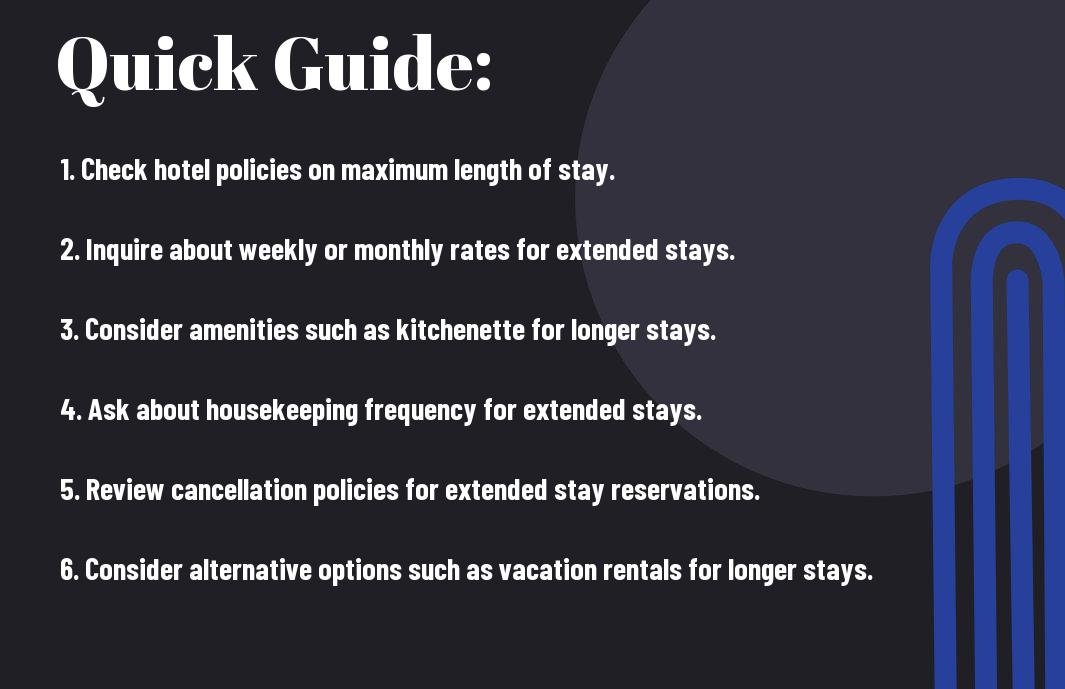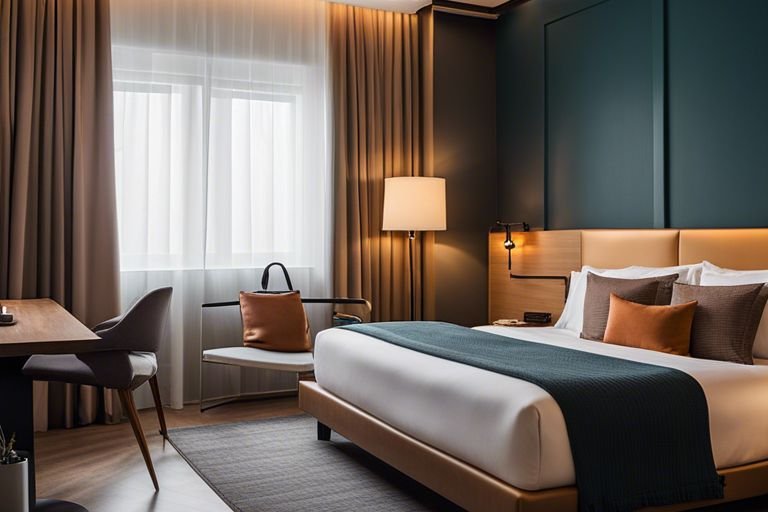Peradventure you find yourself in need of accommodations for a longer period of time, understanding your extended stay options can be crucial. As someone who has spent an extensive amount of time living in hotels, I have unique insight into the benefits and drawbacks of extended stays. In this guide, I will provide you with essential information on how long you can stay in a hotel room, as well as important factors to consider when choosing an extended stay option. Whether you are a business traveler, relocating for a new job, or simply in need of temporary housing, knowing your options can make a significant difference in your experience.
Key Takeaways:
- Extended stay options provide accommodations for longer durations, typically beyond a week or two.
- Most hotels have policies outlining the maximum length of stay, often around 30 days.
- Some hotels offer extended stay suites with convenient amenities such as kitchenettes and laundry facilities.
- Rates for extended stays are often discounted compared to nightly rates, making it a cost-effective option for long-term stays.
- Consideration of the specific needs and amenities required for an extended stay is crucial when choosing the best accommodation option.
Types of Extended Stay Options
Before diving into the various options for extended stays, it’s important to understand the different types of accommodations available. There are traditional hotels, extended stay hotels, and vacation rentals to consider. Each option offers its own unique benefits and features that cater to different needs and preferences.
This information should be broken down into a
| Step | Action |
| 1 | Researching Options |
| 2 | Making Reservations |
| 3 | Checking In and Settling In |
Researching Options
When researching options for an extended stay, I recommend looking for hotels that offer amenities and services tailored to long-term guests. This could include fully equipped kitchenettes, laundry facilities, free Wi-Fi, and a business center. Make sure to read reviews from past guests to get a sense of the overall experience and decide if it meets your needs. Additionally, consider the location and proximity to your workplace or other points of interest.
Making Reservations
After finding the right hotel for your extended stay, it’s time to make reservations. I suggest reaching out directly to the hotel to inquire about extended stay rates and any discounts they may offer for longer stays. It’s also a good idea to ask about their cancellation policy in case your plans change. Once you have all the information you need, book your stay well in advance to secure your preferred dates.
Checking In and Settling In
When you arrive at the hotel for your extended stay, the check-in process may be slightly different from a typical short-term stay. You may be asked to fill out additional paperwork or provide a deposit for the extended stay. During check-in, I advise communicating any specific preferences or requirements you may have for your stay. Once settled in, take some time to familiarize yourself with the hotel amenities and services available to you as a long-term guest.
Factors to Consider When Planning an Extended Stay
Keep budget, duration, location, and amenities in mind when planning an extended stay. Your budget is a key factor in deciding how long you can stay in a hotel room, as well as the type of amenities you can afford. The duration of your stay will impact the type of accommodations you may need, such as a larger room or suite for a longer stay. The location is also important, as it can affect the cost of the room and the accessibility to nearby attractions or necessities. Lastly, consider the amenities of the hotel, such as a kitchenette, laundry facilities, or fitness center, which can enhance your stay.
- Budget: Determine how much you can afford for your extended stay, including accommodations and living expenses.
- Duration: Consider the length of your stay and the type of accommodations you will need for a longer period.
- Location: Research the area to make sure it meets your needs and is convenient for your stay.
- Amenities: Look for hotels that offer the amenities you need to make your extended stay more comfortable.
Perceiving these factors can help you narrow down your options and select the best hotel for your extended stay.
Work or Business Travel
When traveling for work or business, an extended stay hotel can provide the convenience and comfort needed for a productive trip. With amenities such as in-room workspaces, high-speed internet, and business centers, you can focus on your professional tasks without any distractions. Additionally, the flexibility of an extended stay allows for a seamless transition between work and leisure, making it an ideal option for business travelers.
Family or Group Travel
For family or group travel, an extended stay hotel offers the space and amenities needed for a comfortable stay. With options for multiple bedrooms, living areas, and kitchen facilities, everyone can feel at home while traveling together. The convenience of on-site amenities such as pool, recreation areas, and complimentary breakfast can also enhance the experience for families or groups.
Lifestyle and Preferences
When it comes to lifestyle and preferences, an extended stay hotel can cater to individual needs and comforts. Whether you have specific dietary requirements that require access to a kitchen or prefer a specific location for leisure activities, an extended stay hotel can accommodate your lifestyle. With the flexibility to customize your stay, you can create a personalized experience that aligns with your preferences and enhances your overall travel experience.
Pros and Cons of Extended Stay Options
To make an informed decision about whether an extended stay option is right for you, it’s important to consider the pros and cons. Below, I’ve outlined some of the key factors to keep in mind when weighing your options:
| Pros | Cons |
| Flexibility and Comfort | Costs and Expenses |
| Convenience of amenities | Potential higher overall cost |
| Home-like environment | Lack of flexibility in length of stay |
| Maintenance and Housekeeping | Space limitations |
| Access to hotel services | Less privacy compared to traditional rentals |
| Community atmosphere | Less personalization and customization options |
Flexibility and Comfort
When considering an extended stay, the flexibility and comfort of your accommodation are important factors. On one hand, you’ll have the convenience of amenities such as a fully equipped kitchen and a living area that feels like a home away from home. However, the potential downside is feeling confined to a limited space for an extended period of time, which can impact your overall comfort and well-being.
Costs and Expenses
One of the key considerations when opting for an extended stay option is the associated costs and expenses. While the convenience of amenities and access to hotel services can be a major benefit, it’s crucial to weigh this against the potential higher overall cost. Traditional rentals may provide more flexibility in terms of costs and lease terms, so it’s important to factor in these considerations before making a decision.
Maintenance and Housekeeping
Maintenance and housekeeping services can be both a pro and a con of extended stay options. On the plus side, you can enjoy the convenience of regular cleaning and upkeep without the burden of household chores. However, you may also experience less privacy and personalization compared to traditional rentals, which could impact your overall sense of comfort and autonomy.

How Long Can You Stay in a Hotel Room – Understanding Extended Stay Options
With this in mind, I hope you now have a better understanding of the various extended stay options available to you when it comes to staying in a hotel room for an extended period of time. Whether it’s choosing a hotel that offers kitchenettes and laundry facilities or opting for a serviced apartment, there are plenty of options to suit your needs. Keep in mind the factors that are important to you, such as budget, location, and amenities, when making your decision. By doing so, you can ensure that your extended stay is comfortable and convenient.
FAQ
Q: How long can you stay in a hotel room?
A: The length of stay in a hotel room typically depends on the hotel’s policies. Most hotels allow guests to stay for short-term periods, while others offer extended stay options for longer durations. It’s best to check with the specific hotel for their policies on extended stays.
Q: What are extended stay options at hotels?
A: Extended stay options at hotels are designed for guests who need accommodations for longer periods, often weeks or months. These options may include discounted rates, kitchenette facilities, on-site laundry, and other amenities to make long-term stays more comfortable.
Q: Are there any restrictions on how long you can stay in a hotel room?
A: Some hotels may have restrictions on the maximum length of stay for a single reservation. For extended stays, guests may need to renew their reservation periodically or move to a different room. It’s important to clarify these details with the hotel when booking an extended stay.
Q: Can I negotiate the rate for a long-term hotel stay?
A: Many hotels are willing to negotiate rates for long-term stays, especially during slower seasons or for corporate clients. It’s always worth asking about discounted rates or any special offers for extended stays when booking a hotel room for an extended period.
Q: What should I consider when planning an extended stay at a hotel?
A: When planning an extended stay at a hotel, consider factors such as the amenities offered, location, proximity to your destination, access to transportation, and any additional fees or requirements for long-term guests. It’s also important to discuss any specific needs or concerns with the hotel staff to ensure a comfortable and convenient stay.

